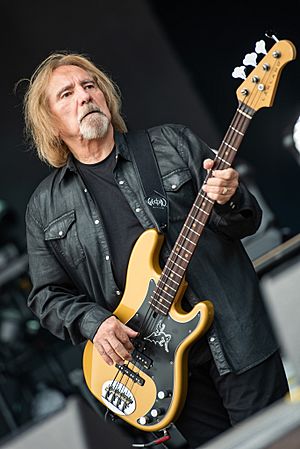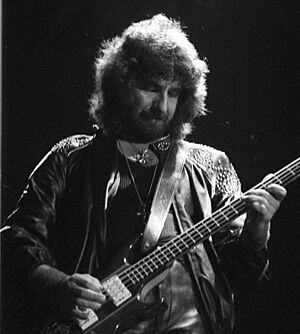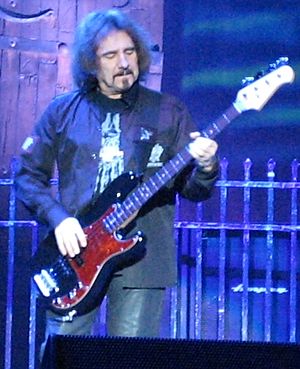Geezer Butler facts for kids
Quick facts for kids
Geezer Butler
|
|
|---|---|

Butler performing with Deadland Ritual in 2019
|
|
| Background information | |
| Birth name | Terence Michael Joseph Butler |
| Born | 17 July 1949 Aston, Birmingham, England |
| Genres |
|
| Occupation(s) |
|
| Instruments | Bass guitar |
| Years active | 1967–2025 |
Terence Michael Joseph "Geezer" Butler (born 17 July 1949) is an English retired musician. He is best known as the bassist and main songwriter for the famous heavy metal band Black Sabbath. He also played with other bands like Heaven & Hell, GZR, Ozzy Osbourne, and Deadland Ritual.
Contents
Early Life and Nickname
Geezer Butler got his nickname "Geezer" when he was young. His older brother was in the army and learned the word "geezer" from people in London. It's a friendly way to say "man" or "mate." When his brother came home, he would call everyone "geezer." Since young Terence looked up to his brother, he started calling his friends "geezer" too, and the name stuck!
Growing Up in Birmingham
Geezer grew up in a working-class family in Aston, Birmingham, England. His parents, James and Mary Butler, were from Dublin, Ireland. He was one of seven children. The family was quite poor, and their home didn't have a telephone, hot water, or an indoor bathroom. They were happy to have their own outdoor toilet.
Despite these challenges, Geezer remembers having a "loving, happy childhood." He was born in a house that had been damaged during the Second World War. When he was just a baby, his older sister Eileen playfully tried to toss him out a window!
School and Reading
At age ten, Geezer passed an important exam and went to Holte Grammar Commercial School in Birmingham. He loved reading, especially English literature like Shakespeare. He says he never went a day without reading something. This love for reading and his imagination helped him write many songs later for Black Sabbath. As a teenager, he was also interested in the writings of Aleister Crowley.
Discovering Music
Geezer became a big fan of bands like The Beatles and The Kinks. He also loved Cream and Jimi Hendrix. In 1963, he waited outside a TV studio in Birmingham to see The Beatles. There, he met another Beatles fan for the first time: Ozzy Osbourne. This meeting was the start of a long musical journey together.
Music Career
Geezer's first band was called The Ruums, which he joined in 1965. They played cover songs at local gigs. Even though the band didn't last long, it made Geezer realize he wanted to spend his life making music.
Forming Black Sabbath
In late 1967, Geezer formed a band called The Rare Breed with Ozzy Osbourne as the singer. Later, Geezer and Ozzy teamed up with guitarist Tony Iommi and drummer Bill Ward. They first called themselves Polka Tulk, then Earth. But because another band was already named Earth, they had to change it again. In early 1969, Geezer suggested the name Black Sabbath, inspired by a horror movie.
Before Black Sabbath, Geezer played rhythm guitar. But Tony Iommi didn't want another guitarist in the band. So, Geezer switched to bass guitar. He said he had never played bass until their very first show! He borrowed a bass that only had three strings. Geezer lists Jack Bruce from Cream as his biggest influence on bass.
In the early days of Black Sabbath, Geezer also helped manage the band's money because he had some training in accounting.
Changes and Reunions
Over the years, Geezer left Black Sabbath a few times but always returned. For example, he briefly left in 1979 after Ozzy Osbourne was no longer in the band. He also left in 1984 but came back months later.
In 1988, Geezer joined Ozzy Osbourne's solo band for a world tour. He rejoined Black Sabbath in 1991 for a reunion but left again in 1994.
He returned to Ozzy's band in 1995 to record an album called Ozzmosis. After that, he started his own band called G/Z/R and released albums like Plastic Planet (1995) and Black Science (1997).
Geezer came back to Black Sabbath again in 1997 and stayed with them. In 2005, he released his third solo album, Ohmwork. In 2006, he formed a new band called Heaven & Hell with Tony Iommi, Vinny Appice, and Ronnie James Dio. This band was a different version of Black Sabbath.
He reunited with Tony Iommi and Ozzy Osbourne to record the Black Sabbath album 13 in 2013. They toured to support the album until 2014. Black Sabbath then went on their final tour, called The End, which finished in February 2017.
In 2023, Geezer published his autobiography, Into the Void: From Birth to Black Sabbath—And Beyond. He also read the audio-book version himself. In June 2024, he made a short appearance with the band Foo Fighters in Birmingham.
In July 2025, Geezer reunited with the original members of Black Sabbath for a special concert called Back to the Beginning.
Musical Style and Influence

When Geezer was a teenager, he learned to play guitar on an old acoustic one that only had two strings. He couldn't afford new strings, so he taught himself to play melodies on those two strings. This helped him develop a unique style that was useful when he switched to bass guitar. Later, his brother gave him a new guitar, which Geezer says changed his life.
Geezer is known for his melodic bass playing. He was one of the first bassists to use a wah pedal and to tune his instrument lower. This matched Tony Iommi, who also tuned his guitar lower. During the time Ozzy Osbourne was the singer, Geezer wrote most of Black Sabbath's lyrics. He often wrote about religion, science fiction, fantasy, and the darker parts of human nature.
Many musicians consider Geezer Butler one of the most important bassists in heavy metal. Billy Sheehan of Mr. Big called him a "founding father of a whole genre of music." Iron Maiden's Steve Harris and former Metallica bassist Jason Newsted have also said Geezer was a huge influence on them. Other bassists like Peter Steele, Mike Watt, and Cliff Burton also listed him as an influence.
In 2020, Rolling Stone magazine ranked him 21st on their list of the "50 Greatest Bassists of All Time."
A week before their final concert, Geezer and the other original members of Black Sabbath were given the special honor of being named Freemen of the City of Birmingham.
Personal Life
Geezer met his first wife, Georgina, at a school dance. They later divorced in 1980. He then met his second wife, Gloria, in 1978. Gloria later managed the band Heaven & Hell. The Butlers live in Los Angeles and have several cats, which Geezer often shares pictures of online.
Geezer has two sons. His oldest son, Biff Butler, was the singer for a band called Apartment 26. His other son, James, studied at Oxford University and lives in London. Geezer describes James as "very politically minded."
Animal Lover and Vegan
Because he loves animals, Geezer became a strict vegetarian as a child. He later became a vegan in the 1990s. He had a pet dog named Scamp when he was young and loved animals very much. When he learned where meat came from, he decided not to eat it anymore. His mother was also a vegetarian. Geezer has supported People for the Ethical Treatment of Animals (PETA) and encouraged people to avoid buying products that cause harm to animals.
Sports Fan
Geezer is a big fan of Aston Villa Football Club, a soccer team. He has called them his "second religion" after Catholicism when he was younger, and now his "only religion." He could hear the cheers from the nearby Villa Park stadium from his childhood home, which greatly influenced him. He loves going to games and considers former Aston Villa player Peter McParland his "all-time hero."
Views on Swearing
According to his bandmate Ozzy Osbourne, Geezer "never uses foul language." When Geezer was a small child, he heard a bad word and repeated it at dinner. His father told him that only ignorant people swear and gave him a gentle punishment. Because of this, Geezer says he rarely swears, even after spending many years with Ozzy Osbourne!
Retirement
In June 2023, Geezer announced that he was retiring from performing live music. He initially said that Black Sabbath was "put to bed," meaning they wouldn't play together again. However, a special one-off reunion concert with the original Black Sabbath group was announced in February 2025 and took place in July of that year.
Equipment
Geezer Butler uses Lakland basses, and he even has his own special model. He also uses DR Strings, EMG pick-ups, and Hartke amplifiers.
Discography
Ozzy Osbourne
Heaven & Hell
|
Black Sabbath
|
Images for kids
-
Geezer Butler with Black Sabbath at Back to the Beginning in 2025
See also
 In Spanish: Geezer Butler para niños
In Spanish: Geezer Butler para niños
 | Chris Smalls |
 | Fred Hampton |
 | Ralph Abernathy |




